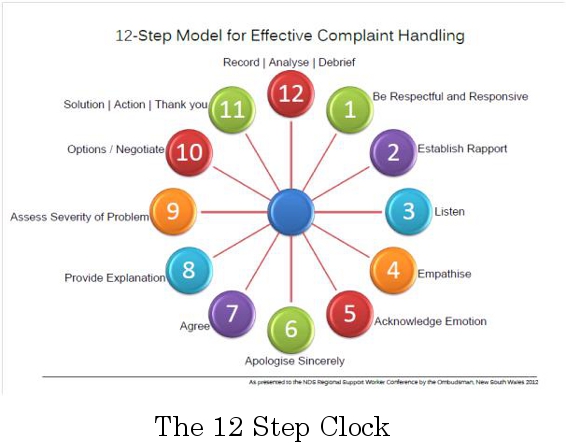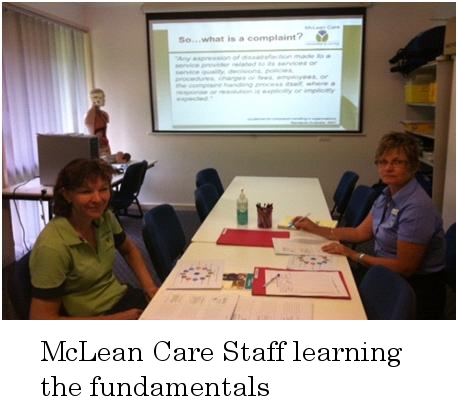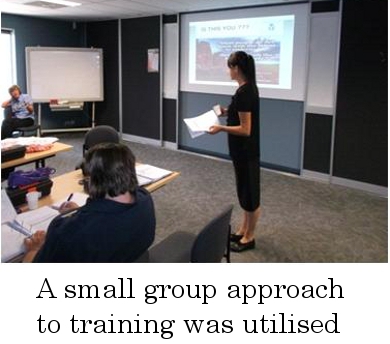The 12 Step Clock Model - McLean Care
The 12 Step "Clock" Model - A Person Centred Approach to Complaint Handling - McLean Care
Sue Thomson, Executive Director Care; McLean CareMcLean Care Ltd (McLean Care) was established as a community - owned, not for profit, registered charity in 1953 and is now one of the largest accredited providers of Aged Care and Disability services covering 100,000 square kilometres throughout the New England and North West regions of New South Wales. McLean Care services over 700 clients and employ's in excess of 350 staff. Services offered include CACPs, EACH, EACHD packages, DVA Community Nursing, Veterans Home Care, Day Therapy and Healthy Ageing Programs, Domestic Assistance (HACC), Carer Respite, Attendant Care for people with disabilities, Private brokered services to organisations, for example, Life without Barriers, insurance companies relating to workers compensation, private nursing services, Residential Aged Care and Independent Living options.

Organisational research commenced early 2012 for a suitable model and in July 2012, the Southern Area Community Care Manager, attended a conference hosted by the National Disability Services which included a presentation by the NSW Ombudsmen, on Quality Complaints Management Systems. The model presented was the 12 Step "Clock" Model for Effective Complaint Handling.
It was then that the.....

moment occurred.
The model is simple, visual and translates easily into practice for frontline workers, managers and executives. Essentially, this model has converted "policy" into practice.
The model places the client at the centre of their complaint by providing an interactive road map between clients, their families and care teams, building on a culture that respects the values and opinions of clients and carers. Partnerships and collaborative dialogue between clients, their family and the care team is real, not symbolic. This 12 step roadmap simultaneously guides staff through the complaints management process and supports staff to make informed decisions regarding escalation at a specific step in the process - the plan to fix the problem takes immediate effect.

The 12 step clock model was rolled out to community and residential care areas in December 2012 following:
- Review of McLean Care complaints Policy and Procedures
- Review of Client complaints procedures and forms
- Review of data capture and analysis tools
- Development and delivery of specific training and a development program for frontline workers, managers and supervisors
- All of the training programs involved education on active listening techniques
- The power imbalance between care teams, and clients and families
- Previous negative experiences which can lead to a feeling of "nothing will change"
- Lack of knowledge on how to lodge a complaint
- Cultural differences
- Care teams understanding themselves to facilitate positive responses
- Active listening to avoid negative communication

"Most people do not listen with the intent to understand; they listen with the intent to reply."
Stephen Covey
By the end of March 75.00% of community staff, across 5 rural sites, will have received the mandatory stand-alone, 1 hour education session.
From an organisational perspective, the capture and analysis of the numbers and types of complaints has always been an important part of our continuous improvement system. The implementation of the 12 Step Clock model has allowed us to improve the quality of the data that we now collect. This model was not introduced with the intent of decreasing client complaints. The intent is to capture any and all expressed concerns, regardless of what they relate to and focus on agreed outcomes and or resolutions within agreed time frames. Follow up and reciprocal feedback is enhanced by the collaborative dialogue that occurs between clients, carers and the care team. We believe these are very real measures of how well we manage complaints according to what's important to clients and families and how well our services are received. McLean Care staff now "...listen with the intent to understand..."

0 comments